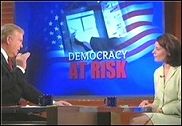http://www.bradblog.com/?p=3545
BLOGGED BY John Gideon ON 9/28/2006 8:08AM
CNN's Lou Dobbs: New Emergency Legislation Could Help Avoid An E-Voting DebacleGuest Blogged by John Gideon
Senate Democrats (and now in the House) have introduced emergency legislation that will allow counties to have 'emergency' paper ballots at poll sites. The bills will ensure there are funds made available to pay for printing those ballots.
The text-transcript of tonight's segment on Lou Dobbs Tonight follows in full�
Senate Democrats tonight are demanding Congress pass last-minute e-voting legislation before November's election. The new legislation could help avoid what many fear now will be an outright e-voting debacle when Americans head to the polls now less than six weeks away.
Kitty Pilgrim reports.
(BEGIN VIDEOTAPE) KITTY PILGRIM, CNN CORRESPONDENT (voice-over): Less than six weeks until the November election, and still utter confusion over the hastily purchased and problem-riddled electronic voting systems across the country. At least 31 million voters will use touch screen electronic voting machines for the first time on November 7th, many without a paper record.
Some in Congress say it is better to have backup, paper ballots but those ballots are expensive to produce, costing up to 92 cents per ballot. Senators Barbara Boxer of California, Christopher Dodd of Connecticut and Russell Feingold of Wisconsin have proposed a $15 million emergency spending bill to reimburse states for the price of printing paper ballots.
The bill states election officials must post "a notice stating that contingency paper ballots are available at the polling place, and that a voter may request to use such a ballot at the voter's discretion.
SEN. BARBARA BOXER (D), CALIFORNIA: I really have lost a lot of faith in these machines and it's expensive. Why not just go back to the simple paper ballot, at least until we're really sure that we've resolved all the problems?
PILGRIM: Also on Capitol Hill today, Senators Russell Feingold and John Kerry introduced a resolution calling for states to have a backup system to deal with any failure of electronic voting equipment. New York University's Brennan Center has a new study on electronic voting.
LAWRENCE NORDEN, NYU BRENNAN CENTER: This was implemented so quickly that we didn't put the right procedures in place. And I think if we do put the right procedures in place, we do put the right security measures in place, that electronic voting can be a great benefit.
PILGRIM: In recent months, machines used during the primaries have crashed and poll workers have been befuddled with running and understanding the machines.
(END VIDEOTAPE)
PILGRIM: Now, a quick update on Colorado. Last week, activists sued to have the state go to an all-paper ballot. The judge refused to decertify the electronic voting machines, but today the court issued 10 pages of detailed rules on operating, testing and securing the machines for the elections and the activists we spoke to call it a victory. Lou.
DOBBS: Well, it sounds like it is and certainly a victory for the people of Colorado. The fact that anyone would even contemplate going into this election without standards and without training and without a paper trail is just completely mindless. Thank you, judge. We don't get to say that very often around here, do we? Kitty, thank you very much. Kitty Pilgrim.